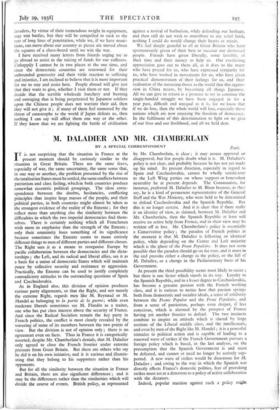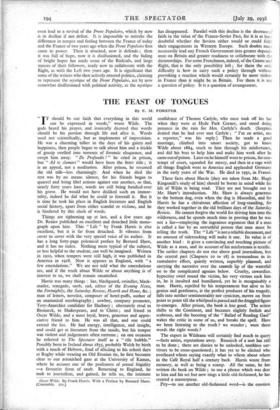M. DALADIER AND MR. CHAMBERLAIN
BY A SPECIAL CORRESPONDENT
Paris.
IT is not surprising that the situation in France at the present moment should be curiously similar to the situation in Great Britain. There are the same fears, especially of war, the same uncertainty, the same sense that, in one way or another, the problem presented by the rise of the totalitarian States must be settled, the same conflicts between patriotism and class feeling, which in both countries produce somewhat eccentric political groupings. The close corre- spondence between the doubts, hesitancies, conflicting principles ) that inspire large masses of the people, and their political parties, in both countries might almost be taken as the strongest evidence of the reality of the Entente ; for they reflect more than anything else the similarity between the difficulties in which the two imperial democracies find them- selves. There is certainly nothing which all Frenchmen wish more :to emphasise than the strength of the Entente ; only their . unanimity loses something of its significance because sometimes the Entente seems to mean entirely different things to men of different parties and different classes. The Right sees it as a means to reorganise Europe by pacific collaboration between the democracies and the dicta- torships; the Left, and its radical and liberal allies, see it as a basis for a union of democratic States which will maintain peace by collective security and resistance to aggression. Practically, the Entente can be used to justify completely contradictory attitudes to the outstanding questions of Spain and Czechoslovakia.
As in England also, this division of opinion produces curious party alignments, so that the Right, and not merely the extreme Right, regards men like M. Reynaud or M. Mandel as belonging to la partie de la guerre; while even moderate liberals sometimes see M. Flandin as a traitor, one who has put class interest above the security of France. And since the Radical Socialists remain the key party in French politics, the conflict is most clearly revealed by the wavering of some of its members between the two points of view. But the division is not of opinion only ; there is no agreement even on facts. Thus in France it is categorically asserted, despite Mr. Chamberlain's denials, that M. Daladier only agreed to close the French frontier under extreme pressure from Great Britain. But there are others who say he did it on his own initiative, and it is curious and illumin- ating that they belong to his supporters rather than his opponents.
But for all the similarity between the situation in France and Britain, there are also significant differences ; and it may be the differences rather than the similarities which will decide the course of events. British policy, as represented by Mr. Chamberlain, is clear ; it may arouse approval or disapproval, but few people doubt what it is. M. Daladier's policy is not clear, and probably because he has not yet made up his mind. Its present direction, especially in regard to Spain and Czechoslovakia, cannot be wholly satisfactory to the Left Wing parties on whose support or benevolent neutrality he at present depends. The Communists, for instance, preferred M. Daladier to M. Blum because, as they say, he is a kind of permanent representative of the General Staff and the War Ministry, who were held to be determined to defend Czechoslovakia and the Spanish Republic. But this is no longer certain. And it is clear that if there really is an identity of view, as claimed, between M. Daladier and Mr. Chamberlain, then the Spanish Republic at least will receive no active help from France, and in their view may be written off as lost. Mr. Chamberlain's policy is essentially a Conservative policy ; the paradox of French politics at the moment is that M. Daladier is following an identical policy, while depending on the Centre and Left majority which is the ghost of the Front Populaire. It does not seem possible that the paradox should go on for ever, and it must in the end provoke either a change in the policy, or the fall of M. Daladier, or a change in the Parliamentary basis of his Government.
At present the third possibility seems most likely to occur ; but there is one factor which stands in its way. Loyalty to the Spanish Republic, and in a lesser degree to Czechoslovakia, has become a genuine passion with the French working class, and it is curious to notice how that passion springs both from democratic and socialist ideals, a sense of solidarity between the Frente Popular and the Front Populaire, and from a sense of patriotism, perhaps even deeper, if less conscious, which is alarmed by the prospect of France having yet another frontier to defend. The two instincts combine to inspire an attitude which is shared by large sections of the Liberal middle class, and the intellectuals, and even by men of the Right like M. Mandel ; it is a powerful stimulus to political action and is capable of leading to a renewed wave of strikes if the French Government pursues a foreign policy which is based, in the last analysis, on the presumption that the Spanish Government is and must be defeated, and cannot or need no longer be actively sup- ported. A new wave of strikes would be disastrous for M. Daladier ; and owing to the way in which the Spanish war directly affects France's domestic politics, fear of provoking strikes must act as a deterrent to a policy of active collaboration with the dictators.
Indeed, popular reaction against such a policy might even lead to a revival of the Front Populaire, which by now is in decline if not defeat. It is impossible to mistake the difference in temper and feeling between the France of today and the France of two years ago when the Front Populaire first came to power. Then it attacked, now it defends ; then it was full of hope, now it is disillusioned, and the fading of bright hopes has made some of the Radicals, and large masses of their followers, ready now to collaborate with the Right, as with the Left two years ago. It is significant that some of the writers who then actively entered politics, claiming to represent the mystique of the Front Populaire, are by now somewhat disillusioned with political activity, as the mystique has disappeared. Parallel with this decline is the decrease cc faith in the value of the Franco-Soviet Pact, for it is at doubtful whether the Soviets either would or could fulfil their engagements in Western Europe. Such doubts must necessarily lead any French Government into greater depend- ance on Britain and greater readiness to collaborate with the dictatorships. For some Frenchmen, indeed, of the Centre and Right, that is the only possibility left ; for them the only difficulty is how to carry such a policy through without provoking a reaction which would certainly be more violent in France than it might be in Britain. For them it is not a question of policy. It is a question of arrangement.



































 Previous page
Previous page